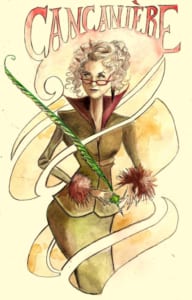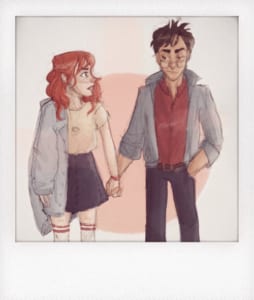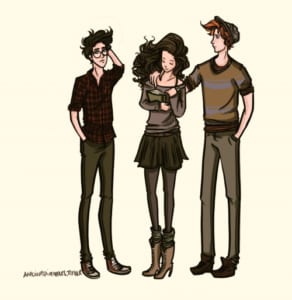Presented by “Harry Poter and the Reread Project”
Much like our LOTR reread project finishing 2016 by finishing The Fellowship of the Ring, I end the year by ending the Goblet of Fire part of the Harry Potter reread series. We left Harry and his friends on the brink of the third task of the Triwizard Tournament, the massive maze on the Hogwarts grounds filled with a variety of magical challenges and with the Triwizard Cup in the middle of it. Of course, as always in the Harry Potter series, the major plot points are surrounded by seemingly minor ones that later on tie into the overall plot of the series – often in ways that aren’t inherently obvious.
Rita Skeeter’s Final Scoop
One of the best examples for that is the article about Harry that Rita Skeeter releases shortly before the third task. In it, she describes how Harry falls asleep in class and dreams of Wormtail and Voldemort, except that she portrays it as Harry having a mental breakdown that makes him unfit to compete in the Tournament and generally dangerous to be around, not to mention untrustworthy. Not only does Rita’s article allow Hermione to finally connect the dots and figure out her status as an illegal animagus who literally bugs people to overhear their conversations for her articles, it also plants the seeds for what we all know will come in Harry Potter and the Order of the Phoenix: namely, the constant portrayal of Harry as unbalanced and untrustworthy.

At the same time, as mentioned, seeing Draco quoted in the article after watching him act suspiciously by talking into his hand as if he was holding a phone or walkie-talkie, is what allows Hermione to figure out something she’s been obsessed with for essentially half of the book. It also allows her to catch and trap Rita Skeeter – fittingly enough while Harry has an emotional, post-traumatic breakdown in Molly Weasley’s arms – and blackmail her into keeping her mouth shut and her quill unused.
To be honest, I used to remember this “capturing and blackmailing” bit a lot worse than it actually was. In my memory, Hermione keeps Rita trapped in an unbreakable jar and in her bug form for almost a year, until she needs her again in Order of the Phoenix to interview Harry. In reality, Hermione keeps Rita trapped until she arrives back in London after the end of year feast which takes place roughly a week after the end of the Tournament. That’s not not bad but it’s definitely significantly less bad then I remembered.
On the other hand, Hermione revealing that she figured out how Rita was listening in on private conversations on the Hogwarts grounds is presented in a way that falls somewhere between “sort of uncomfortable” to “pretty disturbing”. It happens in the last chapter of Goblet of Fire, a chapter that follows a lot of very dark and depressing stuff happening, and is followed by Harry, Ron, Hermione and the twins hexing Draco Malfoy, Crabbe and Goyle. The Slytherin trio had been, as usually, bullying them, even going so far as to essentially rejoice in the prospect of Hermione and Ron dying and mocking the deceased Cedric. There’s a sense of comeuppance in both of these instances – the good characters giving the bullies what they deserve. And the fact that that applies to Hermione’s treatment of Rita Skeeter as well makes me a bit uncomfortable.
Rita is definitely a bully and a generally all around nasty person: she twists people’s words with zero sense for journalistic integrity or responsibility, she plays on gross stereotypes about marginalised groups and she’s vindictive when it comes to people standing up to her, which is why she writes a petty and terrible article about Hermione as some sort of cold gold digger. It’s good to see Hermione figure out how she did it and use it to stop her, even if that involves blackmailing her. But the fact that she essentially keeps Rita imprisoned for at least a week and neither Ron nor Harry so much as bat an eyelash or ask if that isn’t a bit excessive, is not good.
Another thing that really bothered me about the Rita Skeeter storyline isn’t actually about Rita at all, instead it’s about Molly Weasley. When Amos Diggory gives Harry a hard time for not correcting Rita’s portrayal of him as the only Hogwarts champion, Molly rightfully admonishes him for falling for Skeeter’s divisive tactics. At the same time, Molly absolutely buys into her portrayal of Hermione as a gold digger who’ll hurt Harry, as becomes evident when she sends Hermione a chocolate egg for Easter that’s far smaller than those of everyone else. Not only is it deeply hypocritical, it’s also petty and far below Molly, especially because she has to essentially be set right by Harry before being nice to Hermione again. And even then, she doesn’t apologise.
I’ve become pretty disenchanted with the Weasleys in general, as I wrote in my reread summary post a while back. That disenchantment is probably the strongest when it comes to Molly Weasley who I used to think was a pretty good mother and an admirable woman. But Goblet of Fire reminded me of her flaws, like her overprotectiveness, her self-righteousness and her hypocrisy, and it made me genuinely annoyed with her.
The Three Other Champions
Interestingly enough, a sort of reverse development happened with Fleur Delacour: I remember being vaguely annoyed with her the first few times I read Goblet of Fire, but rereading the book made me realise that there is no actual good reason for that. She does start the novel as a very stereotypical, uppity French girl who is weirdly antagonistic and condescending towards Harry which is as annoying as it is probably meant to be, but the later interactions between her and Harry make her seem like a pretty sweet person.
However, I feel like it’s also important to acknowledge that Fleur is the champion that gets the worst deal, in two senses. For one, she is the champion that literally does worst in all of the tasks – she gets accidentally set on fire by her dragon, she gets held up Grindylows in the lake and has to give up and she’s ambushed and stunned by fake Moody in the maze pretty quickly. It makes her seem unnecessarily incompetent, something that leaves a weird aftertaste of misogyny considering she’s the only female champion and the rest of JKR messiness when it comes to gender politics. Additionally, she is also the champion whose views and character we learn the least about in Goblet of Fire, but at least that is ameliorated a bit by her appearances in the rest of the series.
The second champion, Viktor Krum, falls even more into stereotype box. He’s Bulgarian and JKR constantly uses stereotypes about Eastern Europeans: he’s grumpy and rather silent, he looks sallow and unhealthy, has very little sense of humour and is generally a fairly intimidating presence. That’s especially uncomfortable because the other Eastern European characters we see in the books are range between sort of evil to cowardly Death Eaters, as Mims Dahn pointed out in the comment thread on my last article.

On the other hand, Viktor is actually again a genuinely sweet and caring person. He truly likes Hermione and wants to remain in contact with her even though he probably does realise that he feels more for her than she does for him, he compliments Harry on his flying style and expresses admiration for Cedric and sadness over his death. While he isn’t overly charming, he has little in common with the hostile or even evil image other characters in the series, like Hagrid, expect him to be. One could easily read Krum as an embodiment of the “don’t judge books by their cover” – message.
That leaves only one champion to be discussed. Weirdly enough, I find I don’t have much to say about Cedric Diggory himself except what JKR made Dumbledore say about him:
“Cedric was a person who exemplified many of the qualities which distinguish Hufflepuff house […] He was a good and loyal friend, a hard worker, he valued fair play.”
There is literally nothing negative to say about him at all, except maybe that he was too noble for his own good. Which of course makes his death even more upsetting. I don’t think I’ll ever stop being sad about it – which I feel might have been the point: war and extremism kills innocent and good people through no fault of their own and that’s tragic.
On a more light-hearted note, as annoying as love triangles and petty jealousy are, I do find it funny that all three Triwizard champions are essentially a source of jealousy for one of the members of the Trio. It’s obvious both in the case of Harry and Cedric and Ron and Krum, but I noticed that every time Fleur interacts positively with Ron, Hermione is described as having an unhappy or annoyed expression as well. I feel like JKR did well in avoiding the trap of making the other champions nothing but jealousy fuelling love interests for the Trio’s love interests. All of them have distinct characteristics and story lines that have nothing to do with the jealousy aspect and when Krum and Fleur reappear in the later books, neither one falls into the Old Flame trope trap. Additionally, Harry himself realises that his jealousy of Cedric because he’s going out with Cho is silly and moves on from it.
The Third Task, the Portkey and the Graveyard
However, since we’re talking about the last part of Goblet of Fire, the light-heartedness unfortunately cannot last, as the book turns pretty dark and horrifying during its last 50 or so pages. I’m not just talking about Voldemort’s return, though obviously I will touch on that as well – I think the third task of the tournament is in itself pretty grim. It’s definitely a lot more dangerous than the other two, considering how many more dangerous creatures are creeping around the maze and how much longer it would probably take for help to arrive. Harry, for example, injures his leg pretty badly when fighting a spider in the maze and mostly seems to get out of the situation because of Cedric’s help.
At the same time, the third task contains some of the most imaginative challenges for the champions. The mist that turns the world upside down, for example, is one of my favourites, only topped by the sphinx that JKR places in the maze and that gives her a great opportunity to show of her rhyming and riddle skills:
“First think of the person who lives in disguise,
Who deals in secrets and tells naught but lies.
Next, tell me what’s always the last thing to mend,
The middle of middle and end of the end?
And finally give me the sound often heard
During the search for a hard -to-find word.
Now string them together, and answer me this,
Which creature would you be unwilling to kiss?”
I also love how in the end, Goblet of Fire comes back to multiple things that it introduced at its own beginning, like the portkey and the village of Little Hangleton, and answers two of the questions also asked at the beginning of the books, namely who killed the Riddles and what happened to Bertha Jorkins. It’s a sort of mirroring within the book rather than within the overall series that I appreciate.
I especially like the fact that the final act of the book takes place in Little Hangleton where Voldemort committed what was probably his first murder by killing his grandparents and father. One could argue that that was the end of Tom Riddle and the birth of Lord Voldemort, making the fact that that’s also where he is reborn thirteen years after his death incredibly fitting.
Voldemort’s rebirth in general is incredibly horrifying and horrifyingly well-written. There are so many pieces of the scenes in the graveyard that are incredibly scary by themselves but create a truly terrifying overall image. There’s a mysterious bundle that is revealed to actually be the scaley-slimey physical form Voldemort took before he could make and use the potion that gave him back his true body, there’s Wormtail chopping of his own hand without any sort of anaesthesia and consequently suffering for it, there’s the general creepiness of graveyards and there’s the fact that 14-year-old Harry with a hurt leg is tied to one of the gravestones, watching absolutely powerlessly as his worst enemy comes back to life, knowing that it will likely mean his death. It’s a dark, depressing scene that you definitely shouldn’t think about when you’re lying in bed, trying to fall asleep.
This is also a scene that has been built up to for four books that were published over the course of four years, but JKR really delivers. Not only is the atmosphere bone-chillingly scary, the characters are also on point: Voldemort never veers into caricature – territory and Harry never falls into the absolute despair he would have good reason to fall into.
The interactions between Voldemort and the Death Eaters made me wonder how he sees them, as he calls them his true family at one point. Does he truly hold some modicum of affection for them but believes he has to make them fear him so they’ll do as he says? I don’t know and I’m not entirely sure whether I really want to. On the other hand, the same scenes also made it fairly easy to understand why people become and stay Death Eaters.
Another thing that I really liked about the resurrection sequence was getting the story about how Voldemort achieved his resurrection, but leaving large bits of it blank, like the identity of his most loyal Death Eater at Hogwarts, only to have these than later filled in by Barty Crouch Jr. It created nice additional tension by keeping Harry still in danger even after he escaped Voldemort.

And the graveyard scene finally let James and Lily appear as actual characters, even though my understanding how precisely that worked is still more than a bit wobbly. I mean, according to Harry’s descriptions, they were more corporeal than ghosts. Dumbledore calls them “echoes” that retain someone’s character and appearance, but wouldn’t that essentially mean that wands sort of save a piece of the soul of people they kill? And if they’re only echoes, how can they have a distinct consciousness that allows them to have knowlegde and understanding they couldn’t have had at their deaths?
Fudge Fudges the Situation
Maybe the saddest thing about Goblet of Fire is the fact that when Harry finally manages to escape not just Voldemort himself, but also Barty Crouch Jr. and has found a small respite in the Hospital Wing, the floor is once again pulled out from under him when Cornelius Fudge, the Minister of Magic, refuses to even consider the possibility that Voldemort is back.
I’m not going to lie, I sort of get it: Voldemort made life in the Wizarding World absolute hell for years during the First Wizarding War, with people disappearing and being found dead later on or simply being murdered and a constant climate of distrust among wizards and witches. The idea that this would return is quite scary and not believing it when the evidence for it is comparably easy to discredit is, well, the path of least resistance. That doesn’t make it acceptable to take, just understandable. And considering recent political developments, I find the urge to just stick one’s head in the sand even more understandable.
And the evidence for Voldemort’s return really is flimsy and easy to discredit, at least from Fudge’s point of view. Harry has consistently gotten into trouble and just a year ago proclaimed that an escaped murderer was actually innocent and his poor heroic murder victim still alive and actually evil. Barty Crouch Jr. had been imprisoned in Azkaban for 13 years and acted in ways that hinted at mental instability and he gets kissed by a Dementor anyway, meaning that he can’t make any statements. And no one could really see and know what really went on inside the maze, allowing people to come up with a hundred explanations for how Cedric “actually” died instead of considering that Voldemort might have come back and murdered him.
Of course, it’s not just that Fudge refuses to act to prepare the Wizarding World to deal with Voldemort, partially because the measures suggested by Dumbledore would be unpopular. He also feels so threatened by Dumbledore that he threatens to start interfering more in Hogwarts, actively making it harder for Dumbledore and his allies to work against Voldemort.
And Yet, A Silver Lining
This, then, is the stage as it is set at the end of Goblet of Fire: The biggest threat to the Wizarding World is back, but one of the individuals with the most power to do anything about it is not just refusing to see the danger but will probably actively try to hinder Harry and the others. Additionally, Harry has just been through a truly horrible year. He got thrown into a Tournament that far surpassed his abilities and that he did not want to participate in, was subsequently further ostracized by large parts of the school, consistently had to risk his life and ultimately saw one of his fellow students get murdered, was tortured and came within an inch of being murdered himself.
All in all, I feel like calling these prospects bleak or depressing is an almost optimistic way of describing them. Essentially, things have been pretty bad so far, but it looks as if they will only get worse.
Interestingly enough, Harry Potter still doesn’t fall into grimdarkness or despair. Instead, the end of Goblet of Fire left me almost hopeful, for many tiny reasons that still add up to a picture of hopefulness.

For one, there is the aforementioned sense of comeuppance when Rita Skeeter is exposed and Draco, Crabbe and Goyle are hexed. There’s a sense of “evil people will get what they deserve, no matter how much damage they do beforehand” in these scenes that’s eerily comforting. Seeing Sirius and Snape put their enmity aside for at least the moment despite wanting to kill each other roughly a year ago is weirdly gratifying, even if it’s mainly a symbolic handshake that doesn’t really address the reasons for the hostility between them. Ron and Hermione’s steadfast support of Harry is another thing that’s quite comforting. And then there’s the way in which JKR shows the value of not cowering in front of danger and even insurmountably bad odds: Harry decides to defy Voldemort, to die upright and not cowering in fear in front of him and it quite literally saves his life. But maybe the most hopeful part is Dumbledore’s end of year speech in which he says:
“We are only as strong as we are united, as weak as we are divided. Lord Voldemort’s gift for spreading discord and enmity is very great. We can only fight it by showing an equally strong bond of friendship and trust. Differences of habit and language are nothing at all if our aims are identitcal and our hearts are open.”
I think that that’s one of the things that I will probably always like about Harry Potter: even when the story gets incredibly dark, it is ultimately about the ways in which cooperating with each other can push back against that darkness. It’s an inherently optimistic story about good triumphing over evil. I think that won’t ever stop being loveable.

